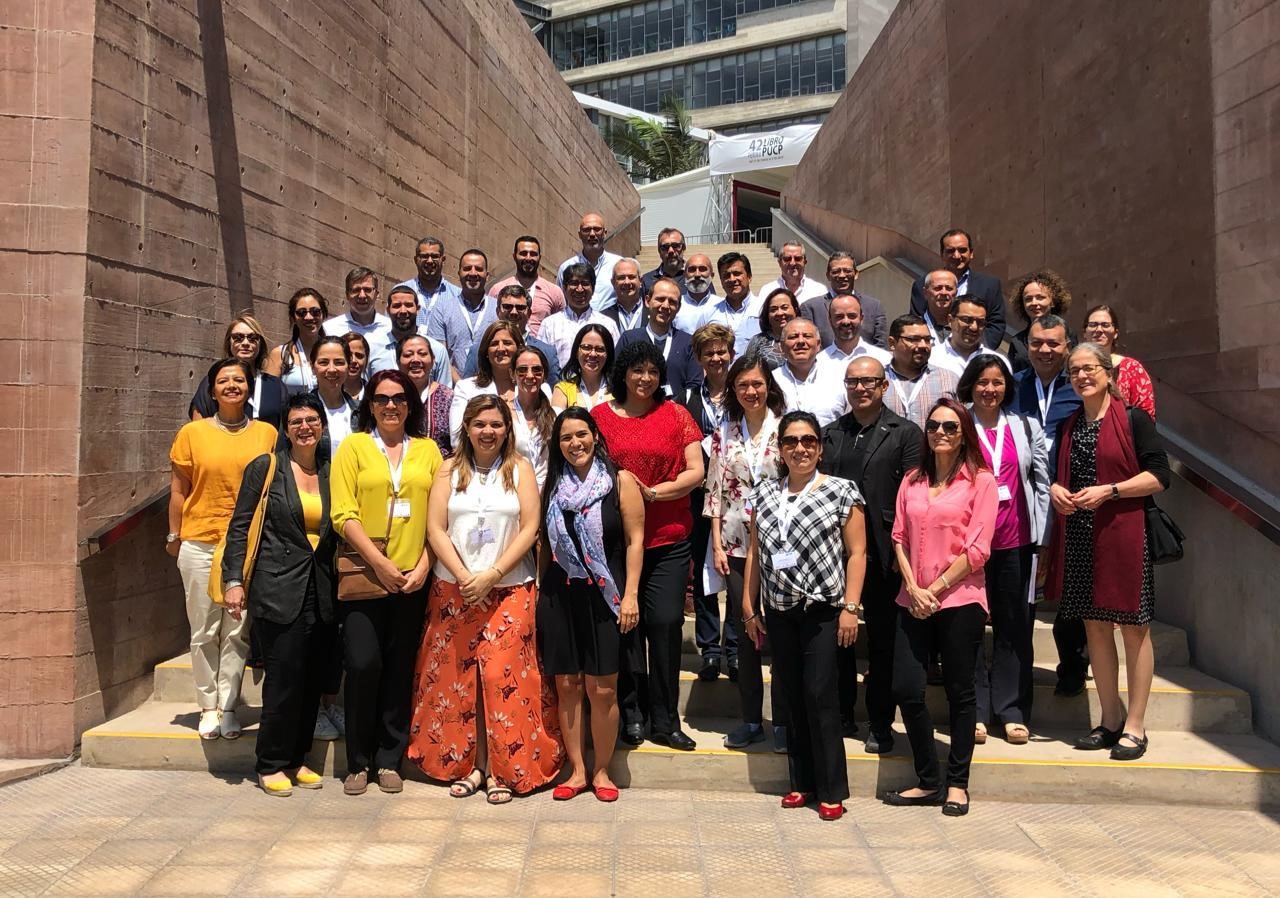Deans of Latin American Universities Meet in Lima to Discuss Management and Internationalisation of Higher Education
(23.04.19) Universities all over the world are facing new challenges as a result of recent global changes, which include demographic factors, migration, technological advancements, political change and new fundraising systems. In view of these scenarios, universities are increasingly recognising the need to pool new skills among their management-level staff and professionalise institutional management processes.

Participants at the meeting of Latin American alumni of the International Deans Course (IDC)
© Universität Saarbrücken
To discuss these challenges and share experiences regarding the implementation of new management plans and strategies, 25 deans from various Latin American universities came together in Lima, Peru at a meeting of Latin American alumni of the International Deans Course (IDC).
The meeting was held on 30 and 31 March at the Pontifical Catholic University of Peru (Pontificia Universidad Católica del Perú, PUCP) and was attended by around 40 participants from previous IDC events. The IDC is a programme element of the Dialogue on Innovative Higher Education Strategies (DIES) offered by the German Academic Exchange Service (DAAD) and the German Rectors’ Conference (HRK).
Launched in 2001, the DIES programme supports universities in newly industrialising countries to improve their management processes, align their training courses with international quality standards and develop their research potential.
According to the organisers of the event, Prof. Dr. Ludger Santen and Prof. Astrid Fellner (Saarland University), the enthusiasm and commitment of the deans who attended were remarkable.
“They approach the tasks involved with a great deal of commitment. In spite of all the problems facing higher education, you sense that many Latin American universities are at an important turning point in their development. The deans want to see change and are willing to take the action needed to improve the situation,” said Fellner.
She also emphasised that one of the initiative’s most important contributions is the formation of an active alumni network, which benefits its members enormously and now counts 17 different institutions among its participants.
As Dr. Iris Danowski, head of the Latin America section in the HRK’s international department, explained, the idea of organising a special course specifically for university managers in Latin America came about in 2012 as a result of the fact that many German universities have important partnerships with universities in Central and South America.
“The DIES programme offers a direct platform for German universities and their partners in the Global South to discuss issues pertaining to university management and to jointly build capacity. But it also helps partner institutions to lay the foundations for the establishment of new partnerships and joint projects with German universities,” she added.
For this reason, the discussion of strategies for international cooperation was a key topic on the agenda. Despite the heterogeneity of the participating institutions and their different countries of origin – which included Peru, Costa Rica, Honduras, Ecuador, El Salvador, Colombia, Argentina, Bolivia, Mexico, Panama and Cuba – the universities face the same challenge of implementing an institutional internationalisation plan which embraces more than just academic mobility and individual partnerships.
For the coordinators, the success of the collaborations depends on the mutually complementary strengths of the individual research systems. “Successful academic collaborations take advantage of the complementary strengths of research systems. For example, Latin America has a wealth of different ecosystems, and the changes occurring in these ecosystems are of vital importance to the study of climate change. Joint research projects in this area demonstrate a genuine exchange of knowledge and scientific expertise. From our perspective, collaborations like these, in which research systems work together on equal terms, offer the best prospects for sustained long-term cooperation,” said Santen, who serves as the academic director of IDC Latin America.
Also present at the meeting was Dr. Kathrin Winkler, director of the DFG’s Latin America office, who explained to participants the activities of the regional office and the opportunities for international cooperation – particularly funding opportunities for bilateral research projects in partnership with Latin American partner organisations.
In addition to the debate on internationalisation, the comprehensive event programme gave participants a detailed overview of the university system in different Latin American countries as well as their different assets and challenges.